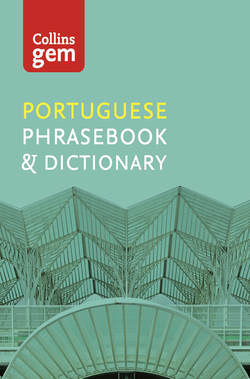Читать книгу Collins Gem - Collins Dictionaries - Страница 7
ОглавлениеPronouncing Portuguese
Portuguese is much easier to read than to speak. However, the pronunciation guide used in this book gives as accurate a guide as possible to the sounds of the language. The syllable to be stressed is printed in bold. Note that in conversation words tend to run together.
Vowels (a, e, i, o, u)
| vowel | example | pronunciation | sounds like |
| a | saco | sah-koo | as in father |
| fama | fumuh | hum | |
| fica | feekuh | about | |
| e | terra | terr-uh | terror |
| enorme | eh-norm | ehenquire | |
| especial | eesh-pessyahl | happy | |
| de | duh | about | |
| i | fica | feekuh | police |
| médico | medeekoo | happy | |
| o | cobra | koh-bruh | all |
| homem | omayñ | au pair | |
| vaso | vah-zoo | boot | |
| u | luvas | loovush | boot |
Notes:
The article a sounds like uh (as in the), unless stressed, i.e. à (ah).
e can sound like ay, e.g. fecho (fayshoo), but tends to be silent at the end of words, e.g. pode (pod) unless stressed, e.g. bebé (be-be). The word e (meaning and) always sounds like ee.
The article o and the letter o at the end of words always sound like oo.
Vowel combinations
| ai | mais | mysh |
| ei | peixe | paysh |
| oi | coisa | koy-zuh |
| ou | outro | oh-troo |
Nasal vowels
Vowels with a tilde ~ or followed by m or n in the same syllable should be pronounced nasally (letting air out through the nose as well as the mouth), as in French. We have represented this sound in the pronunciation by ñ, e.g.
| tem = tayñ | com = koñ | um = ooñ |
| pão = powñ | manhã = mun-yañ | põe = poyñ |
Other letters
| example | pronunciation | sounds like | |
| ç | serviço | serveesoo | |
| ch | chá | shah | |
| g | gelo | zhay-loo | as in measure |
| h | always silent | ||
| j | loja | lozhuh | as in measure |
| Ih | mulher | mool-yehr | |
| nh | tenho | ten-yoo | |
| r/rr | always rolled; ‘r’ at beginning of word and double ‘rr’ are forceful and guttural (similar to French ‘r’) | ||
| s | (between vowels) coisa | koy-zuh | |
| (after vowel and at end of word) está lápis | shtalah-peesh | ||
| x | caixa | ky-shuh | |
| z | (at end of word) faz | fash |
